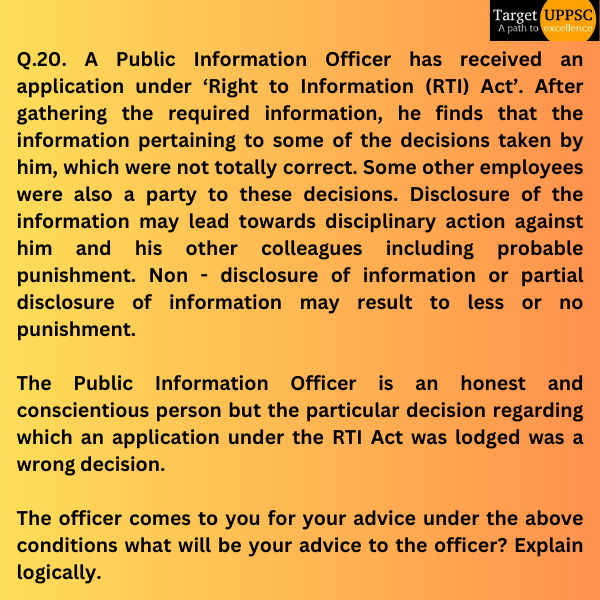2018 GS P4 PYQ Solution, PYQs Solution
Q.20. Case Study:
The Public Information Officer (PIO) is in a challenging position, but it’s important to adhere to the principles of the Right to Information (RTI) Act and the ethical standards expected of public officials. Here’s the advice I would offer:
- Full Disclosure: The PIO should disclose the information as required under the RTI Act. Transparency and accountability are fundamental to the Act, and withholding information, unless exempt under the Act, would be against its spirit.
- Adherence to the Law: The RTI Act mandates the provision of information unless it falls under certain exemptions. The PIO should not withhold information out of fear of consequences but should follow the law faithfully.
- Ethical Responsibility: As an honest and conscientious person, the PIO has an ethical obligation to act with integrity. This includes being accountable for past decisions, even if they were incorrect.
- Corrective Measures: The PIO should take this opportunity to address the wrong decisions and work towards rectifying them. This could involve reviewing the decision-making processes to prevent future errors.
- Seek Guidance: If there is uncertainty about the disclosure, the PIO can seek guidance from higher authorities or legal advisors within the organization.
- Document the Process: The PIO should document the decision-making process regarding the disclosure. This can serve as a record of due diligence and adherence to the RTI Act.
- Prepare for Consequences: While disciplinary action may be a possibility, it is a separate process from the RTI request. The PIO should be prepared to face the consequences and use the experience as a learning opportunity.
In conclusion, the PIO should act in accordance with the law and ethical standards, fully disclosing the information requested under the RTI Act, and be prepared to address any fallout in a constructive manner. This approach not only fulfils the legal obligations but also upholds the values of transparency and accountability essential in public service.
Q. How can the PIO handle potential repercussions from disclosing the information?The Public Information Officer (PIO) can handle potential repercussions from disclosing the information by taking the following steps:
By proactively managing the situation with transparency, consultation, and communication, the PIO can navigate the repercussions while upholding the principles of the RTI Act and public service ethics. |


